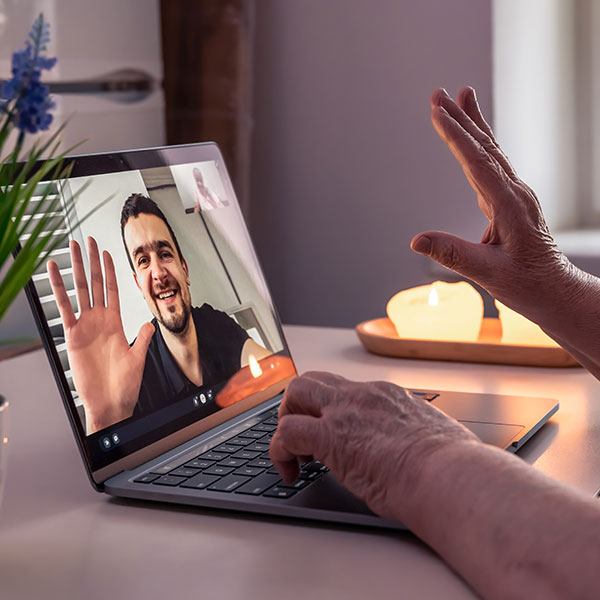The Future of Mental Health: Exploring the Benefits of Virtual Counseling
Introduction to Virtual Counseling
The growing popularity of virtual counseling can be attributed to several key factors:
Accessibility:
Virtual counseling breaks down geographical barriers, allowing individuals to access therapy services regardless of their location. This is especially beneficial for those living in remote areas or with limited access to mental health resources.
Convenience:
Online counseling offers unparalleled convenience. Clients can schedule sessions that fit their busy lifestyles, eliminating the need for time-consuming commutes to physical offices. This flexibility appeals to a wide range of individuals, including working professionals and parents.
Anonymity:
Virtual counseling provides a degree of anonymity that some clients find comforting. It can be less intimidating to open up to a therapist from the privacy of one’s own space, reducing the stigma often associated with seeking therapy.
Variety of Therapists:
Online platforms offer access to a diverse pool of therapists with various specializations. Clients can choose a counselor who aligns with their unique needs and preferences, increasing the likelihood of a successful therapeutic relationship.
Cost-Effective:
Virtual counseling can be more affordable than traditional in-person therapy, as it eliminates expenses related to commuting and office rent. Many platforms also offer subscription-based models or sliding-scale fees to accommodate different budgets.
Crisis Support:
Virtual counseling services often include crisis helplines and immediate chat or video sessions, providing crucial support during emergencies or times of heightened distress.
Technological Advancements:
Advancements in technology have made virtual counseling more accessible and user-friendly. High-quality video conferencing, secure messaging platforms, and user-friendly apps enhance the overall counseling experience.
Pandemic Impact:
The COVID-19 pandemic accelerated the adoption of virtual counseling, as social distancing measures and lockdowns made in-person sessions challenging. Many people turned to online therapy as a safe and reliable alternative.
Normalization:
As virtual counseling becomes more mainstream, it is becoming increasingly normalized in society. This encourages more individuals to seek help for their mental health concerns without fear of judgment.
Research and Efficacy:
Studies have shown that virtual counseling can be as effective as traditional therapy for many individuals, further boosting its appeal.
Overall, the growing popularity of virtual counseling is driven by its convenience, accessibility, and ability to adapt to the changing needs and preferences of clients seeking mental health support.

Mental Health in a Fast-Paced World
Mental health holds immense importance in today’s fast-paced world for several compelling reasons:
Stress and Pressure:
Modern life is often characterized by relentless stress, tight schedules, and high-pressure environments. These factors can take a toll on mental well-being, leading to anxiety, depression, and burnout. Prioritizing mental health is crucial for coping with these challenges effectively.
Physical Health Connection:
Mental health is closely interconnected with physical health. Neglecting mental well-being can lead to a range of physical health problems, including heart disease, obesity, and weakened immune function. Taking care of mental health can contribute to overall well-being and longevity.
Productivity and Creativity:
Good mental health fosters productivity, creativity, and innovation. When individuals are mentally well, they are better equipped to focus, problem-solve, and generate new ideas, which are essential in many fast-paced professions and industries.
Relationships:
Healthy relationships are essential for personal happiness and professional success. Mental health issues can strain relationships and hinder effective communication. Prioritizing mental health can lead to improved interactions and more fulfilling connections with others.
Resilience:
A strong foundation of mental health enhances resilience in the face of adversity. In a fast-paced world with constant change and challenges, the ability to bounce back from setbacks and adapt to new circumstances is invaluable.
Work-Life Balance:
Achieving a balance between work and personal life is increasingly challenging in today’s world. Poor mental health can make it difficult to disconnect from work, leading to burnout. Prioritizing mental health supports a healthier work-life balance, contributing to overall life satisfaction.
Prevention:
Proactive mental health care can prevent the onset of more serious mental illnesses. Addressing stress, anxiety, and mild depressive symptoms early can reduce the risk of these conditions progressing into more severe disorders.
Economic Impact:
Mental health issues can have a significant economic impact on individuals and society. They can result in absenteeism from work, reduced productivity, and increased healthcare costs. Investing in mental health services and support can mitigate these economic burdens.
Community and Societal Well-Being:
The mental health of individuals collectively contributes to the well-being of communities and society at large. A society with good mental health is likely to be more compassionate, empathetic, and supportive, fostering a sense of belonging and social cohesion.
Self-Fulfillment:
Ultimately, mental health is essential for personal self-fulfillment and happiness. It allows individuals to pursue their goals, enjoy life’s pleasures, and find purpose and meaning in their endeavors.
In a fast-paced world where demands and expectations can be overwhelming, recognizing the importance of mental health is not only a matter of personal well-being but also a societal imperative. Prioritizing mental health through self-care, seeking professional help when needed, and promoting mental health awareness can lead to a healthier, happier, and more resilient global community.

Exploring the benefits of virtual counseling
The intention of this blog post is to shed light on the myriad benefits of virtual counseling in today’s digitally-driven world.
In an era marked by fast-paced lifestyles, increased stressors, and evolving preferences for healthcare services, virtual counseling has emerged as a valuable and accessible resource for addressing mental health concerns.
This post aims to delve into the advantages that virtual counseling offers, ranging from its convenience and accessibility to its cost-effectiveness and ability to adapt to the changing needs of clients.
By exploring these benefits, readers will gain a deeper understanding of why virtual counseling has gained prominence and how it can serve as an effective tool for improving mental well-being in our contemporary society.
Virtual Counseling Defined
Virtual counseling, also known as online counseling or teletherapy, is a form of mental health treatment and support that is conducted remotely through digital communication technologies such as video calls, phone calls, chat messages, or email.
It involves a licensed therapist or counselor providing therapeutic services to individuals, couples, or groups over the internet, allowing clients to access mental health support from the comfort of their own homes or other convenient locations.
Virtual counseling encompasses various therapeutic modalities, including psychotherapy, counseling, and emotional support, and is designed to address a wide range of mental health concerns and emotional well-being needs.
Modes of Virtual Counseling
Virtual counseling offers diverse modes of communication to cater to the varying preferences and needs of clients. Here are descriptions of the different modes commonly used in virtual counseling:
Video Calls (Teletherapy):
Video-based virtual counseling involves real-time, face-to-face interactions between the client and therapist using video conferencing platforms. It closely replicates the in-person therapy experience, allowing for non-verbal communication cues, body language, and a more personal connection. Video calls are often preferred for deeper therapeutic work and are suitable for a wide range of mental health issues.
Phone Calls (Telephonic Counseling):
Telephonic counseling involves therapy sessions conducted over the phone. This mode offers privacy and convenience, making it accessible to those who may not have reliable internet access or prefer voice-based communication. Phone calls are effective for addressing issues like anxiety, depression, and relationship challenges.
Text-Based Counseling (Chat or Messaging):
Text-based virtual counseling occurs through written exchanges, typically in real-time chat or asynchronous messaging formats. Clients communicate with therapists by typing messages, allowing them to express thoughts and feelings at their own pace. This mode is suitable for individuals who are more comfortable with written communication, have social anxiety, or need support with less severe concerns.
Email Counseling:
Email counseling involves ongoing therapeutic communication via email messages. Clients write emails to their therapists, and therapists respond within a specified time frame. It offers the advantage of thoughtful, written communication, making it suitable for reflective or longer-form discussions. However, it may have longer response times compared to real-time modes.
Chatbots and AI-Based Platforms:
Some virtual counseling services incorporate chatbots and AI-driven platforms that provide automated responses and support. While not a substitute for human therapists, these tools can offer immediate assistance, psychoeducation, and coping strategies for less complex issues.
Hybrid Models:
Many virtual counseling platforms offer a combination of these modes. Clients may have the option to switch between video, phone, and text-based sessions based on their preferences and needs, providing flexibility and continuity in their therapeutic journey.
Each mode of virtual counseling has its unique advantages and considerations. The choice of mode often depends on factors such as the nature of the client’s concerns, their comfort level with technology, privacy requirements, and personal preferences.
Skilled therapists adapt their approach to suit the chosen mode, ensuring that clients receive effective and personalized support for their mental health and well-being.

Advantages of Virtual Counseling: Accessibility and Convenience
Virtual counseling offers several significant advantages in terms of accessibility and convenience, particularly in eliminating geographical barriers:
Geographical Freedom:
One of the most prominent advantages of virtual counseling is the elimination of geographical barriers. Clients can access therapy services from virtually anywhere in the world, regardless of their physical location. This is especially beneficial for individuals living in rural or remote areas where access to mental health professionals may be limited.
Increased Availability:
Virtual counseling expands the pool of available therapists and counselors. Clients have the opportunity to choose from a broader range of mental health professionals with diverse specialties and expertise, increasing the likelihood of finding the right therapist to address their specific needs.
Reduced Travel Time:
Virtual counseling saves clients time and energy that would otherwise be spent commuting to and from in-person therapy sessions. This is particularly advantageous for those with busy schedules or mobility challenges.
Flexibility in Scheduling:
Virtual counseling provides flexibility in scheduling sessions. Clients can often choose appointment times that work best for them, including evenings and weekends. This flexibility accommodates individuals with demanding work commitments, childcare responsibilities, or other time constraints.
Comfort and Privacy:
Many clients find it more comfortable to engage in therapy from the privacy of their own home or another secure location. This can reduce the stigma associated with seeking therapy and create a safe, confidential space for sharing and self-exploration.
Consistent Access:
Virtual counseling ensures consistent access to therapy even in situations where clients may relocate or travel frequently. Clients can maintain a therapeutic relationship with their chosen therapist, regardless of their physical location.
Emergency Support:
Virtual counseling platforms often offer crisis helplines and immediate chat or video sessions, ensuring that individuals can access mental health support in urgent situations, regardless of where they are located.
Accessibility for Diverse Needs:
Virtual counseling can be tailored to meet the needs of diverse populations, including individuals with disabilities or those who require accommodations for specific communication preferences.
Cross-Cultural Support:
Clients can access therapists who may better understand their cultural or linguistic background, fostering a more culturally sensitive and relatable therapeutic experience.
Cost Savings:
Eliminating the need for travel can result in cost savings for clients, as they do not incur expenses related to transportation, parking, or time away from work.
Overall, virtual counseling’s elimination of geographical barriers significantly improves mental health care accessibility and convenience. It ensures that individuals from all walks of life can access the support they need, when they need it, without being constrained by geographic limitations. This democratization of mental health services is a crucial step in addressing the growing demand for accessible and inclusive mental health care.

Advantages of Virtual Counseling: Privacy and Comfort
Virtual counseling offers distinct advantages in terms of privacy and comfort, which can be particularly beneficial for individuals seeking therapy. Here are some key advantages:
Privacy in Familiar Surroundings:
Virtual counseling allows clients to engage in therapy from the comfort of their own homes or other private locations. This familiar environment can enhance a sense of security and privacy, making it easier for clients to open up and share their thoughts and feelings.
Reduced Stigma:
Some individuals may feel stigmatized or self-conscious about attending in-person therapy sessions. Virtual counseling offers a level of anonymity that can reduce the perceived stigma associated with seeking mental health support, encouraging more people to access the help they need.
Confidentiality:
Virtual counseling platforms and therapists are required to adhere to strict privacy and confidentiality standards. Online communication channels are encrypted and secure, ensuring that clients’ personal information and session content remain confidential.
Control Over Visibility:
Clients have control over their video camera, microphone, and screen sharing settings during virtual sessions. This means they can choose to remain fully or partially anonymous by adjusting their visibility as needed, giving them a sense of control over their privacy.
Comfort in Expression:
Some individuals find it easier to express themselves in writing or through text-based communication, which is an option in virtual counseling. This mode allows clients to carefully choose their words and articulate their thoughts and feelings more effectively.
Flexible Post-Session Space:
After a virtual counseling session, clients have the freedom to remain in their comfortable and private space, allowing them to process their thoughts and emotions without the need to travel home immediately.
Cultural Sensitivity:
Virtual counseling can accommodate clients from diverse cultural backgrounds who may have unique preferences for gender, age, or cultural congruence with their therapist. This flexibility contributes to a more culturally sensitive therapeutic experience.
Accessibility for Individuals with Physical Disabilities:
Virtual counseling eliminates physical barriers for individuals with mobility issues or physical disabilities, ensuring that they can access therapy without the challenges of commuting to a physical location.
Enhanced Focus on Client’s Needs:
By allowing clients to engage in therapy from their chosen private space, virtual counseling can reduce distractions and interruptions that might occur in a therapist’s office, enabling a more focused and effective therapeutic process.
Comfort in Crisis Support:
In emergency situations or moments of acute distress, virtual counseling platforms often offer immediate chat or video sessions. This ensures that clients can seek help promptly while remaining in a private and secure environment.
Overall, the privacy and comfort provided by virtual counseling can foster a therapeutic environment that is conducive to open and honest communication, ultimately enhancing the effectiveness of therapy and making mental health support more accessible and inviting to a wider range of individuals.

Advantages of Virtual Counseling: Availability of Specialized Counselors
Virtual counseling offers distinct advantages when it comes to the availability of specialized counselors, making it easier for individuals to find therapists who meet their unique needs and preferences. Here are some key advantages in this regard:
Expanded Pool of Specialists:
Virtual counseling platforms often have a larger pool of therapists and counselors with diverse specializations. This means clients have a greater chance of finding a counselor who specializes in their specific mental health concerns or life circumstances.
Access to Experts:
Individuals can access highly specialized therapists who may not be available locally. Whether someone is seeking therapy for a rare condition, a specific trauma, or a unique life circumstance, virtual counseling allows them to connect with experts who can provide tailored support.
No Geographic Limitations:
Geographic location is no longer a barrier to accessing specialized counselors. Clients can connect with therapists from different cities, states, or even countries, ensuring that they can find the right expert regardless of where they live.
Cultural Competence:
Clients from diverse cultural backgrounds can benefit from specialized counselors who understand their cultural nuances, beliefs, and experiences. Virtual counseling allows individuals to access therapists who are culturally competent and can provide culturally sensitive care.
LGBTQ+ Affirming Therapy:
For individuals seeking LGBTQ+-affirming therapy or counseling related to gender identity and sexual orientation, virtual platforms offer a wide range of therapists who are experienced in providing support in this area.
The availability of specialized counselors in virtual counseling platforms ensures that individuals can receive targeted, expert care that addresses their unique mental health and well-being needs. This increased accessibility to specialists can significantly enhance the quality of care and outcomes for clients seeking therapy and support.

Advantages of Virtual Counseling: Cost-Effective Counseling
Virtual counseling offers several cost-effective benefits for both clients and therapists, making mental health support more accessible to a broader range of individuals. Here are some key advantages in terms of cost-effectiveness:
Reduced Transportation Costs:
Virtual counseling eliminates the need for clients to incur transportation costs associated with traveling to and from in-person therapy sessions. This includes expenses related to fuel, public transportation, parking fees, and even time off work for appointments.
No Office Overhead:
Therapists who provide virtual counseling often have lower overhead costs compared to maintaining physical office spaces. This can result in more affordable session fees for clients.
Flexible Pricing Models:
Many virtual counseling platforms offer flexible pricing models, such as sliding-scale fees based on income or subscription plans that provide cost savings for regular users. This ensures that mental health services are accessible to individuals with varying financial means.
Reduced Time-Related Costs:
Virtual counseling saves clients valuable time that would otherwise be spent commuting to in-person sessions. This can be especially beneficial for individuals with busy schedules who might need to take time off work or rearrange their day to attend therapy appointments.
No Childcare Costs:
Parents can access virtual counseling without the additional expense of hiring childcare or arranging for someone to look after their children during in-person therapy sessions. This convenience can make it easier for parents to prioritize their mental health.
Cost Savings on Additional Expenses:
In-person therapy may involve additional expenses, such as purchasing gas or public transportation tickets, professional attire, or parking permits. Virtual counseling eliminates many of these incidental costs.
Insurance Coverage:
Some insurance plans cover virtual counseling services, making mental health support more affordable for insured individuals. Check with insurance providers to see if virtual counseling is a covered benefit.
No Relocation Costs:
Individuals who relocate frequently for work or personal reasons can maintain their therapeutic relationships without the need to find a new therapist in each new location, saving time and money.
Access to Affordable Specialists:
Virtual counseling can connect clients with specialized therapists who may offer more cost-effective rates than their in-person counterparts, as they can serve a broader client base.
Convenient Payment Options:
Virtual counseling platforms often offer convenient payment options, such as online payment processing, making it easy for clients to manage their therapy expenses.
Free or Low-Cost Resources:
Virtual counseling platforms may provide free or low-cost mental health resources, such as self-help materials, educational content, and crisis helplines, further promoting cost-effective mental health care.
The cost-effectiveness of virtual counseling makes it a viable and affordable option for individuals seeking mental health support, regardless of their financial circumstances. This accessibility ensures that more people can prioritize their mental well-being and access the help they need to lead healthier and happier lives.

Tips for Choosing a Virtual Counselor
When choosing a virtual counselor, conducting thorough research and considering their credentials is essential to ensure that you receive effective and safe mental health support. Here are some tips to help you make an informed decision:
Check Licensure and Credentials:
Verify that the counselor is licensed to practice in your state or country. Mental health licensure requirements vary by location, so make sure they meet the specific qualifications necessary to provide therapy legally. Look for degrees in fields like psychology, social work, counseling, or psychiatry.
Review Their Specialization:
Consider your specific needs and concerns. Look for counselors who specialize in the areas most relevant to you, whether it’s anxiety, depression, relationship issues, trauma, addiction, or another specific concern. Specialized expertise can enhance the quality of care.
Research Their Experience:
Inquire about the counselor’s years of experience and the number of clients they have worked with in your specific area of concern. More experienced therapists may have a deeper understanding of complex issues.
Check Online Reviews and Ratings:
Look for reviews and ratings of the counselor or the virtual counseling platform they are associated with. Pay attention to feedback from previous clients to get an idea of their effectiveness and professionalism.
Ask for Recommendations:
Seek recommendations from trusted sources, such as friends, family members, or healthcare professionals. They may be able to refer you to a counselor who has a good reputation.
Interview Multiple Counselors:
Consider conducting initial consultations with multiple counselors before making a decision. This allows you to assess their communication style, approach, and how comfortable you feel with them.
Review Ethical Standards:
Ensure that the counselor adheres to ethical guidelines and codes of conduct. This includes maintaining confidentiality, respecting boundaries, and prioritizing your best interests.
Inquire About Licensing and Insurance:
If you plan to use insurance, check whether the counselor accepts your insurance plan. Additionally, inquire about fees, payment methods, and any sliding-scale options for those with financial constraints.
Assess Communication Methods:
Confirm which virtual communication methods the counselor uses (video calls, phone calls, text-based messaging) and ensure that they align with your preferences and comfort level.
Ask About Emergency Procedures:
Inquire about the counselor’s procedures for handling crises or emergencies. They should have a clear plan in place for providing support when urgent situations arise.
Trust Your Instincts:
Ultimately, trust your intuition when choosing a counselor. A strong therapeutic relationship is built on trust and rapport, so it’s essential that you feel comfortable and understood by the therapist you select.
Verify Secure and HIPAA-Compliant Platforms:
Ensure that the virtual counseling platform used by the counselor is secure and compliant with HIPAA (Health Insurance Portability and Accountability Act) regulations to protect your privacy and confidentiality.
By conducting thorough research and carefully considering the credentials and qualifications of virtual counselors, you can increase the likelihood of finding a therapist who is well-suited to your needs and can provide you with effective and supportive mental health care.

Virtual Counseling in the Future
The future of virtual counseling holds significant promise for improving mental well-being in numerous ways:
Increased Access to Care:
Virtual counseling bridges geographical gaps, making mental health services accessible to individuals in underserved or remote areas. This expanded access ensures that more people can seek support, reducing disparities in mental health care.
Enhanced Convenience:
Virtual counseling offers unmatched convenience, allowing clients to schedule sessions at times that suit their busy lives. This flexibility encourages more people to prioritize their mental health without disrupting their daily routines.
Innovation in Therapy Modalities:
Virtual counseling encourages the development of innovative therapeutic modalities, including virtual reality (VR) therapy, mobile apps, and AI-driven interventions. These technologies can enhance the effectiveness of therapy and engage clients in new ways.
Integration into Healthcare Systems:
Virtual counseling is increasingly integrated into healthcare systems, making it a seamless part of overall healthcare. This integration promotes holistic well-being and recognizes the importance of mental health in overall health outcomes.
Targeted Prevention and Early Intervention:
Virtual counseling can play a key role in targeted prevention and early intervention efforts. By identifying and addressing mental health concerns at an early stage, it can prevent more serious conditions from developing.
Crisis Support and Hotlines:
Virtual counseling platforms often offer crisis support and hotlines, providing immediate assistance to individuals in distress. This quick response can save lives and offer critical support during difficult times.
Data-Driven Insights:
Virtual counseling platforms can collect anonymized data on client outcomes and therapeutic processes. Analyzing this data can lead to insights that improve the effectiveness of mental health interventions and treatment plans.
Global Collaboration:
Virtual counseling enables therapists to collaborate with colleagues and specialists worldwide, fostering a global exchange of knowledge and expertise in the field of mental health.
Continuity of Care:
For individuals who frequently relocate or travel, virtual counseling ensures continuity of care. They can maintain their therapeutic relationships without the need to search for a new therapist in each location.
The bright future of virtual counseling lies in its potential to make mental health support more accessible, convenient, and effective for individuals from all walks of life. As technology continues to advance and society recognizes the importance of mental well-being, virtual counseling is poised to play a pivotal role in promoting mental health and improving the overall quality of life for millions of people.

Virtual Counseling Frequently Asked Questions:
How does virtual counseling work?
Virtual counseling, also known as online therapy or teletherapy, operates on the premise of providing mental health support and therapeutic services through digital communication technologies.
Clients begin by selecting a reputable virtual counseling platform or therapist offering online services, based on research into credentials, specialties, and reviews. They then schedule sessions via the platform’s scheduling system or directly with the therapist.
During the session, clients and therapists connect securely through video calls, phone calls, or text-based messaging, tailored to individual preferences.
Therapists employ evidence-based techniques to address specific mental health concerns, fostering personal growth and progress toward therapeutic goals.
Between sessions, clients can communicate with their therapists through secure messaging platforms.
Overall, virtual counseling offers convenient, accessible, and effective mental health support.
It allows individuals to connect with licensed professionals from the comfort of their own space, accommodating various communication preferences and enabling them to prioritize their mental well-being, regardless of geographical constraints or scheduling conflicts.
Is virtual counseling effective?
Yes, virtual counseling can be highly effective for many individuals. Numerous studies and research findings have demonstrated its efficacy in addressing various mental health concerns.
The convenience and accessibility of virtual counseling make it more likely for people to engage in therapy regularly, leading to improved outcomes. Additionally, virtual platforms offer specialized therapists, allowing clients to find experts who can address their specific needs.
Moreover, the privacy and anonymity of virtual counseling often foster a comfortable environment for clients to discuss their emotions and experiences openly.
Therapists conducting virtual sessions utilize evidence-based approaches, ensuring that clients receive effective treatment tailored to their unique situations. However, the effectiveness of virtual counseling may vary depending on individual preferences, the severity of the issue, and the quality of the therapist-client relationship.
Therefore, selecting a licensed and experienced therapist who aligns with your goals and preferences is crucial, as the therapeutic relationship is a significant factor in the success of counseling, whether conducted virtually or in person.
Is virtual counseling secure?
Virtual counseling can indeed be secure, but it relies on several critical factors.
First and foremost, the chosen counseling platform or therapist must prioritize and adhere to robust security measures. This includes compliance with relevant data protection laws, such as HIPAA in the United States, to ensure that sensitive client information remains confidential.
Encryption plays a pivotal role in securing virtual counseling. Strong encryption methods should be in place to safeguard all communication between clients and therapists, preventing unauthorized access to session content.
Additionally, therapists should undergo training to understand the risks and best practices associated with maintaining confidentiality and data security in the digital realm.
Clients also bear responsibility in maintaining security during virtual counseling.
This involves using secure internet connections, protecting login credentials, and accessing counseling services from private and secure locations.
By choosing reputable platforms, verifying therapists’ security protocols, and actively participating in securing their own information, individuals can help ensure that virtual counseling remains a secure and confidential means of seeking mental health support.
Who is an appropriate candidate for virtual counseling?
Virtual counseling may not be suitable for everyone, and there are specific scenarios where alternative forms of mental health support may be more appropriate.
First, individuals in severe mental health crises, experiencing active suicidal thoughts, or intense emotional distress, should prioritize immediate in-person care or crisis intervention, as virtual counseling may not provide the necessary immediate assistance.
Also, individuals who lack access to a private and confidential environment for virtual sessions due to living arrangements or other circumstances may find virtual counseling impractical.Those with limited technological access or digital literacy may struggle to engage effectively in virtual counseling and may benefit more from in-person therapy or other support avenues.
Finally, personal preference for face-to-face interaction, language or communication barriers, complex mental health needs, or legal and ethical requirements in certain jurisdictions may influence the appropriateness of virtual counseling. In such cases, exploring alternative mental health support options that align with individual circumstances and needs is advisable.

